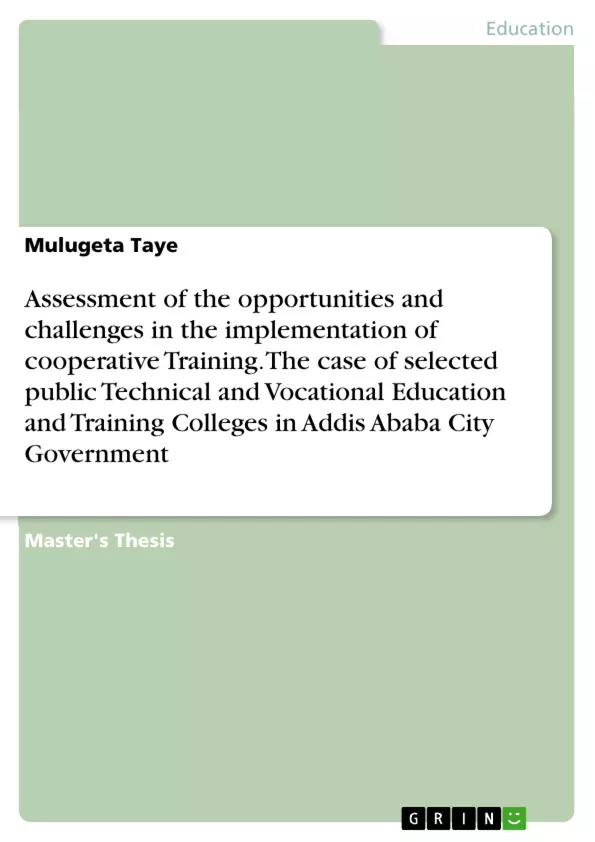The main purpose of the study was to assess the opportunities and challenges in the implementation of cooperative training in three government colleges in Addis Ababa City Government. To this end , an attempt was made to look in to the criterion for selecting and placement of trainees on cooperative training enterprises, arrangements and selection procedures of cooperative training enterprises , the extent of cooperative training delivery, the opportunities and challenges of implementing cooperative training were raised as basic question. Opinions and views of trainees , trainers, supervisors and deans on the adequacy and appropriateness of training period , evaluation and supervision of trainees at the work place , the extent of cooperative training delivery, the opportunities and challenges of implementing cooperative training were treated. The study employed descriptive analysis of the data collected in regular programs of the three colleges selected from Entoto Poly TVET College (EPTVETC), Misrak Poly TVET College (MPTVETC) and Nifas silk Poly TVET College(NPTVETC) .The subject of the study were 3 deans , 3 cooperative training coordinators/ vocational counselors, 185 trainers, 273 trainees and 3 cooperative training enterprises .Trainees and trainers were selected through stratified random sampling technique while deans, supervisors and coordinators of cooperative training were selected through purposive sampling techniques. The data gathered were organized using descriptive statistical analysis .The finding of the study revealed that availability of supervisor and occupation were widely used criterion to select cooperative training enterprises in EPTVETC and MPTVETC while interest of cooperative training enterprises was the dominant factor in selecting cooperative training enterprises for NPTVETC trainees .Placement of trainees to practice centers was done by agreement between colleges and cooperative training enterprises. Factors that affect the practice in the colleges include shortage of training materials , the low qualification of trainers, transport cost of trainees due to long distance they traveled for cooperative training. Moreover, the opportunities in the implementation of cooperative include , the existence of strategies , guidelines , potential enterprises in Addis Ababa and the emphasis of government towards cooperative training program. [...]
Inhaltsverzeichnis (Table of Contents)
- CHAPTER ONE
- 1. INTRODUCTION
- 1.1 Background of the Study
- 1. 2. Statement of the problem
- 1.3.Basic questions
- 1.4 objective of the study
- 1.4.1 General objective
- 1.4.2 Specific Objectives
- 1.5. Significance of the study
- 1.6. Delimitations and Scope of the Study
- 1.7. Limitations of the Study
- 1.8. Definition of Terms
- 1.9. Organization of the study
- CHAPTER TWO
- 2. REVIEW OF RELATED LITRATURE
- 2.1 Concept of Cooperative Training
- 2.2 TVET Obejctives on Cooperative Training
- 2.3 Basic Standards /Guidelines and Cooperative Training Agreement Documents
- 2.3.1 Guideline document
- 2.3.2 Memorandum of agreement between TVET institutions and Enterprises
- 2.3.3 The training contract document between Enterprise and trainee
- 2.4. Who is Involved in Cooperative Training?
- 2.5. Monitoring the Training Progress
- 2.6. Inspecting Cooperative Training Site
- 2.7 Responsibilities of participating parties in cooperative Training program
- 2.8 Benefits to partners involved in cooperative training program
- 2.8.1 Benefits to enterprises
- 2.8.2 Benefits to TVET institutions/colleges
- 2.8.3 Benefits to trainees
- 2.9 Challenges in implementing cooperative training
- 2.9. Cooperative Training Program in some selected countries
- 2.9.1 The German cooperative training program
- 2.9.2 The cooperative training program in the Philippines
- 2.9.3 An Overview of Cooperative Training Program in Ethiopian TVET
- CHAPTER THREE
- 3. Research Design and Methodology
- 3.1 Research Design
- 3.2 Source of Data
- 3.2.1. Primary sources
- 3.2. 2. Secondary source
- 3.3 Data gathering Instruments
- 3.3.1 Questionnaires
- 3.3.2. Interview
- 3.4 Data Gathering Procedures
Zielsetzung und Themenschwerpunkte (Objectives and Key Themes)
This thesis investigates the opportunities and challenges in implementing cooperative training programs in selected public technical and vocational education and training (TVET) colleges in Addis Ababa City Government. It aims to evaluate the current state of cooperative training, identify factors contributing to its successful implementation, and understand the challenges faced by stakeholders. The key themes explored in the research include:- The concept of cooperative training and its role in TVET
- The benefits and challenges of implementing cooperative training programs for both TVET institutions and enterprises
- An analysis of the experiences of different countries with cooperative training programs, including Germany and the Philippines
- An assessment of the current state of cooperative training in Ethiopia
- The development of recommendations for improving the effectiveness of cooperative training in TVET colleges in Addis Ababa
Zusammenfassung der Kapitel (Chapter Summaries)
Chapter One: Introduction
This chapter introduces the research topic, providing background information on cooperative training in TVET. It outlines the research problem, defining the specific objectives of the study and its significance. The chapter also delves into the delimitations, limitations, and definitions of key terms used in the research.Chapter Two: Review of Related Literature
Chapter Two examines the existing literature related to cooperative training. This section explores the theoretical foundations of cooperative training, focusing on its benefits and challenges for different stakeholders. The chapter further analyzes the experiences of different countries with cooperative training programs, highlighting best practices and potential pitfalls.Chapter Three: Research Design and Methodology
This chapter outlines the research design and methodology employed in the study. It discusses the data sources used, including both primary and secondary sources. The chapter also details the data gathering instruments, such as questionnaires and interviews, and explains the procedures used to collect and analyze the data.Schlüsselwörter (Keywords)
The study focuses on the implementation of cooperative training within the context of Technical and Vocational Education and Training (TVET) in Addis Ababa City Government. Key terms include: cooperative training, TVET, public technical and vocational education, challenges, opportunities, Ethiopia, Addis Ababa, skills development, workforce development, and partnership.- Quote paper
- Mulugeta Taye (Author), 2014, Assessment of the opportunities and challenges in the implementation of cooperative Training. The case of selected public Technical and Vocational Education and Training Colleges in Addis Ababa City Government, Munich, GRIN Verlag, https://www.grin.com/document/293612



